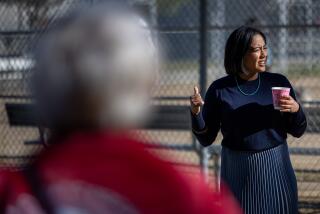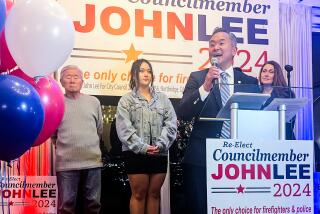LOCAL ELECTIONS / L.A. MAYOR : Katz Leads Pack in Raising Funds From Lobbyists
- Share via
While running hard against “the City Hall crowd,” Los Angeles mayoral candidate Richard Katz has been collecting more money from the city’s top lobbying firms, employees and clients than any major figure in the race, a city Ethics Commission study shows.
Katz’s $42,151 in donations from lobbying firm employees and special interest clients dwarfed the $26,890 collected by front-runner Michael Woo, one of Katz’s chief targets, the study showed.
Much of Katz’s money came from lawyers whose firms represent clients at City Hall, most notably Latham & Watkins downtown. The firm and its lawyers donated more than $20,000 to Katz, who is lagging behind rivals in Tuesday’s election campaign.
The firm’s clients include Catellus Development, which has a massive commercial-office project planned at Union Station; Fox Inc., which has been battling for approval of a $200-million expansion of its Westside studio, and Maguire Thomas Partners, whose Playa Vista project near Marina del Rey is one of the largest in city history.
The largest individual lobbyist donation to Katz, $2,500, was from Latham & Watkins lawyer George Mihlsten. Mihlsten could not be reached for comment Thursday, but earlier he told The Times that he organized a fund-raising reception at the law firm for Katz. He said that he, his firm and his associates have been contributing to many candidates to encourage the campaign debate, not to seek special influence. “I don’t think contributions ensure anything,” he said.
The Woo camp gleefully sought to turn Katz’s campaign theme back on the assemblyman. “It’s kind of curious that Mr. Outsider is the leader in getting money from downtown influence-seekers,” said Woo spokesman Garry South.
Katz’s campaign manager, Peter Taylor, said the report was unfair because it took the lobbyist contributions out of Katz’s “entire picture” of $1.4 million in donations from 3,700 donors.
Taylor said the attacks on the “City Hall crowd” have been focused “entirely on the management of City Hall; how it is mismanaged and how money is wasted.”
Woo’s donors also included Latham & Watkins lawyers and other top lobbying firms and employees that represent everything from bus bench firms to trash haulers to Lockheed Corp., which hopes to lease Los Angeles International Airport.
Wealthy businessman Richard Riordan, who is personally bankrolling most of his own $4.2-million campaign, has marketed himself as an outsider, not beholden to special interests. Riordan received just $7,400 from the lobbying interests, the report showed, and his campaign said it demonstrated “the political insider hypocrisy that afflicts both the City Hall and Sacramento crowds.”
But South, of the Woo campaign, said Riordan’s own $3-million donation to his campaign should be counted as special interest money because his law firm has had many government contracts. “He is a downtown powerbroker, lobbyist, influence peddler,” South said.
In all, the commission study--the first of its kind prepared by an official city agency in the midst of a Los Angeles election--found $222,000 in direct donations by 25 top lobbying firms, as well as their employees and clients. The money was spread among candidates in 11 city races.
It represents a small share of the more than $10 million raised by dozens of candidates. And it does not fully capture the tens of thousands of dollars that lobbyists have helped funnel to candidates by filling tables at fund-raisers.
Still, the 3-year-old ethics agency said the report provides a useful insight on how government works.
In another campaign-related development, a conservative think tank dismissed the significance of a new city report that greatly reduces estimates of the short-term revenue that could be generated by leasing the Los Angeles airport--a cornerstone of Riordan’s plan to field 3,000 more police officers without raising taxes.
The Reason Foundation, which has been promoting the airport lease concept for years, said the new analysis was flawed because it assumed a status quo operation at the airport. That ignores the potential to generate hundreds of millions of dollars annually through a creative commercial lease or sale, and restructuring of airport debt and development, said Robert Poole of the foundation.
Poole acknowledged that Riordan’s charitable foundation has contributed $10,000 to support the group’s research efforts, but he said that in no way influenced the research or Thursday’s response.
Also Thursday, officials in the city’s election division released final figures on the record number of absentee ballot requests they have received. The 132,181 applications received by Tuesday’s deadline is a 50% increase over the previous high, which was recorded in the 1991 municipal election.
Absentee voting has increased steadily in Los Angeles for nearly a decade, said Kris Heffron, chief of the Election Division.
The first wide-open mayoral race in decades and aggressive absentee voter campaigns by several candidates may have sparked the high total, Heffron said. However, some political analysts have speculated that there will be a surge of absentee voting because of fears of civil disorder after verdicts in the Rodney G. King civil rights case.
Election officials said they have had “a few” poll workers drop out because of anxiety over the possibility of unrest. “We’ve always had people who can’t work on Election Day and we’ve had a slightly higher number this year,” Heffron said. “But we aren’t having much difficulty finding people to replace them.”
Meanwhile, Woo and Riordan on Thursday moved the battleground for their bitter attacks from television to mailboxes.
Woo’s hit piece contends that Riordan “can’t be trusted to fight for reform.” It also notes: “Richard Riordan and convicted felon Michael Milken were partners in six leveraged buyouts.”
According to associates, Riordan collaborated with Milken in five deals, four of which were leveraged buyouts. In any case, Riordan campaign manager Jadine Nielsen said it is unfair to attack a candidate because of his associations. “Woo’s obsession with convicted felons is fascinating,” Nielson said. “When is he going to respond to getting thousands of dollars from convicted felon Patrick Moriarty, the fireworks king?”
As a City Council candidate in 1981, Woo accepted a donation of allegedly laundered money from Moriarty, who later pleaded guilty to mail fraud. Woo said at the time he did not know that the contribution may have been laundered.
The Riordan mailer accuses Woo of installing a $12,000 toilet in his office “when a public men’s room was just one door down the hall,” exploiting the Police Department by using unauthorized photos of Police Chief Willie L. Williams in his campaign ads, and responding to killings in schools by threatening “gun-toting punks in classrooms with--a warning?”
Woo spokesman South said the mailer misrepresents Woo’s position on students caught carrying guns in school. South said Woo believes that “kids who are caught with guns in school ought to be removed from the classroom, but rather than thrown out onto the street put into a supervised situation like a boot camp.”
In addition, the Riordan mailer attacks the lending record of a bank with ties to Woo and his family. “Woo bases his revitalization plans on capital infusions to the inner-city from Asian banks,” says the Riordan mailer. “But Cathay Bank, in which he recently held stock and his family helps run, wouldn’t make one home loan to an African-American in the last two years.”
Woo has pointed out that he never was an officer of the bank and has no control over its business practices. South said Cathay Bank is primarily a commercial bank, and as such, has loaned millions of dollars to businesses owned by Asian Americans, Latinos and African-Americans.
Times staff writers Richard Simon and James Rainey contributed to this story.
More to Read
Sign up for Essential California
The most important California stories and recommendations in your inbox every morning.
You may occasionally receive promotional content from the Los Angeles Times.













